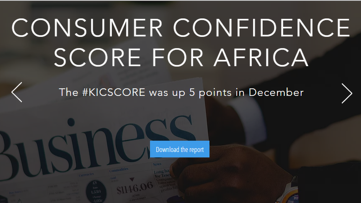Consumer's confidence fell slightly in February
- Team Insights

- Mar 12, 2017
- 3 min read
Updated: Sep 12, 2023

Is Ivory Coast growth flowing to the real economy?
The Global KIC Score fell yet again in February, this time by 2 points to reach 7. At this level, it means that the number of consumers who are optimistic is almost exactly countered by those are pessimistic ( a score of zero implies equal numbers in both camps). With a maximum of 100 and a minimum of -100, the current KIC level indicates that economic confidence is barely positive in the cities polled. The sub-index for current economic condition metric remained negative at -20. However, consumers have hope in the future with the sub-index for economic expectations falling by one point to 17.
The January readings of the KIC score range from 0 (Abidjan and Nairobi) to +17 (Johannesburg).
Johannesburg most confident about national and city economy
Johannesburg has maintained the very bullish mood experienced in January. Consumers in Johannesburg are by far the most optimistic about economic conditions in the country and in the city. Consumers in Lagos are a distant second on both measures. The South African economy is expected to recover from very low growth this year. Consumers in Abidjan and Accra are the least optimistic about their respective countries and cities. This reflects the uncertainty facing most African economies, with the prospect of rising commodity prices tempered by unpredictable demand in advanced economies facing heightened political risk.
Personal finances looking up in Johannesburg and Abidjan
Consumers in Johannesburg are the most optimistic about their income prospects over the next six months, followed by those in Lagos. But as was seen last month, this optimism does not translate to expectations about meeting regular expenses, where Johannesburg residents lag far behind all other cities. Consumers in Abidjan are the most positive when asked whether they will be able to meet their regular expenses over the next six months. This disjuncture between views about the economy and personal finance may also reflect perceptions about inequality, where ordinary consumers do not believe that national or even regional economic gains flow proportionately to all residents. The divergence might also be a function of consumers’ more realistic and accurate assessment of their own personal finances relative to their assessment of the overall economy.
Residents in Douala the most willing to spend
As in January, consumers across the cities surveyed are holding tight to their purses. The score for buying durables is in negative territory in Abidjan and Nairobi, and barely positive in Johannesburg. Residents in Douala are the most willing to spend money on durables. In most cities except Douala, residents are also likely to keep their spending on durables static in the next six months.
KASI KIC Score’s 3500 sample survey of individuals in 8 urban centers in Africa was carried out between February 17 – 23 of this year, and was conducted online.
Trudi Makhaya, economic advisor at KASI Insight said that "The readings and trend we obverse with the KIC score show that macro economic indicators such as foreign direct investment don't necessarily translate into immediate consumer spending or improved personal finance. Ivory Coast has seen an increase in FDI over the past couple of years but it doesn't seem to have trickled down to mainstream. More budget pressure is expected with the drop in cocoa prices, the country main export"
Download the full report
About the KIC Score
The KASI Insight Consumer Confidence Score (KIC SCORE) is a composite index compiled from a seven-questions survey that runs monthly via our consumer polls in the countries covered. The data output is based on fresh, randomly selected representative sample of city dwellers aged 18-64.
Learn how the KIC Score can help your business!
About KASI Insight
KASI Insight is Africa's most innovative research and advisory firm. We solve problems that present challenges for most firms doing business in Africa - lack of fresh local market data and the need for contextual insight and innovative research methods. We provide market research, actionable insights and data driven advice from over 10 countries in Africa.
Contact our team today to explore how our economic intelligence can empower your decision-making process. Win with confidence with Kasi insights https://www.kasiinsight.com/thehub





Comments